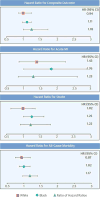Comparative Effectiveness of Angiotensin-Converting Enzyme Inhibitor-Based Treatment on Cardiovascular Outcomes in Hypertensive Blacks Versus Whites
- PMID: 26361152
- PMCID: PMC4567693
- DOI: 10.1016/j.jacc.2015.07.021
Comparative Effectiveness of Angiotensin-Converting Enzyme Inhibitor-Based Treatment on Cardiovascular Outcomes in Hypertensive Blacks Versus Whites
Abstract
Background: Clinical trial evidence suggests poorer outcomes in blacks compared with whites when treated with an angiotensin-converting enzyme (ACE) inhibitor-based regimen, but this has not been evaluated in clinical practice.
Objectives: This study evaluated the comparative effectiveness of an ACE inhibitor-based regimen on a composite outcome of all-cause mortality, stroke, and acute myocardial infarction (AMI) in hypertensive blacks compared with whites.
Methods: We conducted a retrospective cohort study of 434,646 patients in a municipal health care system. Four exposure groups (Black-ACE, Black-NoACE, White-ACE, White-NoACE) were created based on race and treatment exposure (ACE or NoACE). Risk of the composite outcome and its components was compared across treatment groups and race using weighted Cox proportional hazard models.
Results: Our analysis included 59,316 new users of ACE inhibitors, 47% of whom were black. Baseline characteristics were comparable for all groups after inverse probability weighting adjustment. For the composite outcome, the race treatment interaction was significant (p = 0.04); ACE use in blacks was associated with poorer cardiovascular outcomes (ACE vs. NoACE: 8.69% vs. 7.74%; p = 0.05) but not in whites (6.40% vs. 6.74%; p = 0.37). Similarly, the Black-ACE group had higher rates of AMI (0.46% vs. 0.26%; p = 0.04), stroke (2.43% vs. 1.93%; p = 0.05), and congestive heart failure (3.75% vs. 2.25%; p < 0.0001) than the Black-NoACE group. However, the Black-ACE group was no more likely to develop adverse effects than the White-ACE group.
Conclusions: ACE inhibitor-based therapy was associated with poorer cardiovascular outcomes in hypertensive blacks but not in whites. These findings confirm clinical trial evidence that hypertensive blacks have poorer outcomes than whites when treated with an ACE inhibitor-based regimen.
Keywords: antihypertensive medications; cardiovascular disease; electronic health record; race.
Copyright © 2015 American College of Cardiology Foundation. Published by Elsevier Inc. All rights reserved.
Figures



Comment in
-
Using Practice-Based Evidence to Reduce Disparities in Care: A Virtuous Cycle Turns.J Am Coll Cardiol. 2015 Sep 15;66(11):1234-1235. doi: 10.1016/j.jacc.2015.07.046. J Am Coll Cardiol. 2015. PMID: 26361153 No abstract available.
References
-
- Mensah GA, Mokdad AH, Ford ES, et al. State of disparities in cardiovascular health in the United States. Circulation. 2005;111:1233–41. - PubMed
-
- Wong MD, Shapiro MF, Boscardin WJ, Ettner SL. Contribution of major diseases to disparities in mortality. N Engl J Med. 2002;347:1585–92. - PubMed
-
- Heiat A, Gross CP, Krumholz HM. Representation of the elderly, women, and minorities in heart failure clinical trials. Arch Intern Med. 2002;162:1682–8. - PubMed
-
- Yusuf S, Sleight P, Pogue J, et al. Effects of an angiotensin-converting-enzyme inhibitor, ramipril, on cardiovascular events in high-risk patients. The Heart Outcomes Prevention Evaluation Study Investigators. N Engl J Med. 2000;342:145–53. - PubMed
-
- Taylor AL, Wright JT., Jr Should ethnicity serve as the basis for clinical trial design? Importance of race/ethnicity in clinical trials: lessons from the African-American Heart Failure Trial (A-HeFT), the African-American Study of Kidney Disease and Hypertension (AASK), and the Antihypertensive and Lipid-Lowering Treatment to Prevent Heart Attack Trial (ALLHAT) Circulation. 2005;112:3654–60. discussion 3666. - PubMed
Publication types
MeSH terms
Substances
Grants and funding
LinkOut - more resources
Full Text Sources
Other Literature Sources
Medical
Miscellaneous

